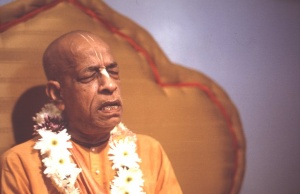SB 10.7.17: Difference between revisions
m (1 revision(s)) |
(Vanibot #0054 edit - transform synonyms into clickable links, which search similar occurrences) |
||
| (One intermediate revision by one other user not shown) | |||
| Line 1: | Line 1: | ||
{{info | {{info | ||
|speaker= | |speaker=Śukadeva Gosvāmī | ||
|listener=King | |listener=King Parīkṣit | ||
}} | }} | ||
[[Category:Srimad-Bhagavatam - Canto 10 Chapter 07]] | |||
[[Category:Bhagavatam Verses Spoken by Sukadeva Gosvami - Vanisource|100717]] | |||
<div style="float:left">'''[[Srimad-Bhagavatam]] - [[SB 10|Tenth Canto]] - [[SB 10.7: The Killing of the Demon Trnavarta|Chapter 7: The Killing of the Demon Tṛṇāvarta]]'''</div> | |||
<div style="float:right">[[File:Go-previous.png|link=SB 10.7.16]] '''[[SB 10.7.16]] - [[SB 10.7.18]]''' [[File:Go-next.png|link=SB 10.7.18]]</div> | |||
{{RandomImage}} | |||
==== TEXT 17 ==== | ==== TEXT 17 ==== | ||
<div | <div class="verse"> | ||
viprā mantra-vido yuktās | :viprā mantra-vido yuktās | ||
tair yāḥ proktās tathāśiṣaḥ | :tair yāḥ proktās tathāśiṣaḥ | ||
tā niṣphalā bhaviṣyanti | :tā niṣphalā bhaviṣyanti | ||
na kadācid api sphuṭam | :na kadācid api sphuṭam | ||
</div> | </div> | ||
| Line 17: | Line 22: | ||
==== SYNONYMS ==== | ==== SYNONYMS ==== | ||
<div | <div class="synonyms"> | ||
''[//vanipedia.org/wiki/Special:VaniSearch?s=viprāḥ&tab=syno_o&ds=1 viprāḥ]'' — the ''brāhmaṇas''; ''[//vanipedia.org/wiki/Special:VaniSearch?s=mantra&tab=syno_o&ds=1 mantra]-[//vanipedia.org/wiki/Special:VaniSearch?s=vidaḥ&tab=syno_o&ds=1 vidaḥ]'' — completely expert in chanting the Vedic hymns; ''[//vanipedia.org/wiki/Special:VaniSearch?s=yuktāḥ&tab=syno_o&ds=1 yuktāḥ]'' — perfect mystic ''yogīs''; ''[//vanipedia.org/wiki/Special:VaniSearch?s=taiḥ&tab=syno_o&ds=1 taiḥ]'' — by them; ''[//vanipedia.org/wiki/Special:VaniSearch?s=yāḥ&tab=syno_o&ds=1 yāḥ]'' — whatsoever; ''[//vanipedia.org/wiki/Special:VaniSearch?s=proktāḥ&tab=syno_o&ds=1 proktāḥ]'' — was spoken; ''[//vanipedia.org/wiki/Special:VaniSearch?s=tathā&tab=syno_o&ds=1 tathā]'' — becomes just so; ''[//vanipedia.org/wiki/Special:VaniSearch?s=āśiṣaḥ&tab=syno_o&ds=1 āśiṣaḥ]'' — all blessings; ''[//vanipedia.org/wiki/Special:VaniSearch?s=tāḥ&tab=syno_o&ds=1 tāḥ]'' — such words; ''[//vanipedia.org/wiki/Special:VaniSearch?s=niṣphalāḥ&tab=syno_o&ds=1 niṣphalāḥ]'' — useless, without fruit; ''[//vanipedia.org/wiki/Special:VaniSearch?s=bhaviṣyanti&tab=syno_o&ds=1 bhaviṣyanti] [//vanipedia.org/wiki/Special:VaniSearch?s=na&tab=syno_o&ds=1 na]'' — never will become; ''[//vanipedia.org/wiki/Special:VaniSearch?s=kadācit&tab=syno_o&ds=1 kadācit]'' — at any time; ''[//vanipedia.org/wiki/Special:VaniSearch?s=api&tab=syno_o&ds=1 api]'' — indeed; ''[//vanipedia.org/wiki/Special:VaniSearch?s=sphuṭam&tab=syno_o&ds=1 sphuṭam]'' — always factual, as it is. | |||
</div> | </div> | ||
| Line 24: | Line 29: | ||
==== TRANSLATION ==== | ==== TRANSLATION ==== | ||
<div | <div class="translation"> | ||
The brāhmaṇas, who were completely expert in chanting the Vedic hymns, were all yogīs fully equipped with mystic powers. Whatever blessings they spoke were certainly never fruitless. | The brāhmaṇas, who were completely expert in chanting the Vedic hymns, were all yogīs fully equipped with mystic powers. Whatever blessings they spoke were certainly never fruitless. | ||
</div> | </div> | ||
| Line 31: | Line 36: | ||
==== PURPORT ==== | ==== PURPORT ==== | ||
<div | <div class="purport"> | ||
Brāhmaṇas fully equipped with the brahminical qualifications are always yogīs fully powerful in mystic yoga. Their words never fail. In every transaction with other members of society, brāhmaṇas are certainly dependable. In this age, however, one must take into account that the brāhmaṇas are uncertain in their qualifications. Because there are no yajñic brāhmaṇas, all yajñas are forbidden. The only yajña recommended in this age is saṅkīrtana-yajña. Yajñaiḥ saṅkīrtana-prāyair yajanti hi sumedhasaḥ ([[SB 11.5.32]]). Yajña is meant to satisfy Viṣṇu (yajñārthāt karmaṇo 'nyatra loko 'yaṁ karma-bandhanaḥ ([[BG 3.9]]))). Because in this age there are no qualified brāhmaṇas, people should perform yajña by chanting the Hare Kṛṣṇa mantra (yajñaiḥ saṅkīrtana-prāyair yajanti hi sumedhasaḥ). Life is meant for yajña, and yajña is performed by the chanting of Hare Kṛṣṇa, Hare Kṛṣṇa, Kṛṣṇa Kṛṣṇa, Hare Hare/ Hare Rāma, Hare Rāma, Rāma Rāma, Hare Hare. | ''Brāhmaṇas'' fully equipped with the brahminical qualifications are always ''yogīs'' fully powerful in mystic ''yoga''. Their words never fail. In every transaction with other members of society, ''brāhmaṇas'' are certainly dependable. In this age, however, one must take into account that the ''brāhmaṇas'' are uncertain in their qualifications. Because there are no yajñic ''brāhmaṇas'', all ''yajñas'' are forbidden. The only ''yajña'' recommended in this age is ''saṅkīrtana-yajña''. ''Yajñaiḥ saṅkīrtana-prāyair yajanti hi sumedhasaḥ'' ([[SB 11.5.32]]). ''Yajña'' is meant to satisfy Viṣṇu (''yajñārthāt karmaṇo 'nyatra loko 'yaṁ karma-bandhanaḥ'' ([[BG 3.9]]))). Because in this age there are no qualified ''brāhmaṇas'', people should perform ''yajña'' by chanting the Hare Kṛṣṇa ''mantra'' (''yajñaiḥ saṅkīrtana-prāyair yajanti hi sumedhasaḥ''). Life is meant for ''yajña'', and ''yajña'' is performed by the chanting of Hare Kṛṣṇa, Hare Kṛṣṇa, Kṛṣṇa Kṛṣṇa, Hare Hare/ Hare Rāma, Hare Rāma, Rāma Rāma, Hare Hare. | ||
</div> | </div> | ||
__NOTOC__ | |||
<div style="float:right; clear:both;">[[File:Go-previous.png|link=SB 10.7.16]] '''[[SB 10.7.16]] - [[SB 10.7.18]]''' [[File:Go-next.png|link=SB 10.7.18]]</div> | |||
__NOTOC__ | |||
__NOEDITSECTION__ | |||
Latest revision as of 19:47, 17 February 2024

A.C. Bhaktivedanta Swami Prabhupada
TEXT 17
- viprā mantra-vido yuktās
- tair yāḥ proktās tathāśiṣaḥ
- tā niṣphalā bhaviṣyanti
- na kadācid api sphuṭam
SYNONYMS
viprāḥ — the brāhmaṇas; mantra-vidaḥ — completely expert in chanting the Vedic hymns; yuktāḥ — perfect mystic yogīs; taiḥ — by them; yāḥ — whatsoever; proktāḥ — was spoken; tathā — becomes just so; āśiṣaḥ — all blessings; tāḥ — such words; niṣphalāḥ — useless, without fruit; bhaviṣyanti na — never will become; kadācit — at any time; api — indeed; sphuṭam — always factual, as it is.
TRANSLATION
The brāhmaṇas, who were completely expert in chanting the Vedic hymns, were all yogīs fully equipped with mystic powers. Whatever blessings they spoke were certainly never fruitless.
PURPORT
Brāhmaṇas fully equipped with the brahminical qualifications are always yogīs fully powerful in mystic yoga. Their words never fail. In every transaction with other members of society, brāhmaṇas are certainly dependable. In this age, however, one must take into account that the brāhmaṇas are uncertain in their qualifications. Because there are no yajñic brāhmaṇas, all yajñas are forbidden. The only yajña recommended in this age is saṅkīrtana-yajña. Yajñaiḥ saṅkīrtana-prāyair yajanti hi sumedhasaḥ (SB 11.5.32). Yajña is meant to satisfy Viṣṇu (yajñārthāt karmaṇo 'nyatra loko 'yaṁ karma-bandhanaḥ (BG 3.9))). Because in this age there are no qualified brāhmaṇas, people should perform yajña by chanting the Hare Kṛṣṇa mantra (yajñaiḥ saṅkīrtana-prāyair yajanti hi sumedhasaḥ). Life is meant for yajña, and yajña is performed by the chanting of Hare Kṛṣṇa, Hare Kṛṣṇa, Kṛṣṇa Kṛṣṇa, Hare Hare/ Hare Rāma, Hare Rāma, Rāma Rāma, Hare Hare.